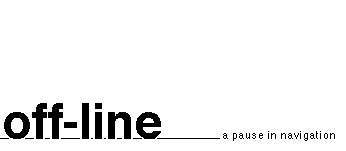 |
 |
|
 |
 |
|
| Giancarlo Livraghi gian@gandalf.it |
|
| |
||
| The hype pipers are still loud, but there isn’t much of a crowd following them. Companies, large and small, are getting bored with unrealistic promises about "e-commerce". Most simply stay away; a few insist on stupid solutions, such as setting up a website "just to be there". Even in the UK, where they are ahead of most European countries in net development, a recent survey by Fletcher Research confirmed what other studies had found. Companies are confused; if they try to use the internet they do little more that putting online "a glorified digital company brochure." Most businesses are employing "keep up with the Jones" style web strategies and merely copying each other’s websites. In other places, such as Italy, it’s even worse. Most of the managers and entrepreneurs I know are bright, up-to-date, open to technology and innovation. Why do they behave so strangely? Because they have no time to waste with things they don’t understand; and the messy noise that surrounds the net, with its unsavory mixture of technomythology and technophobia, is enough to induce perplexity in the most innovative people. I think we need to take a hard look at what is being offered and said by the so-called experts. From universities to countless conventions, from press to television, too many promises are being made that nobody can keep. Too many staggering numbers, too many offerings of miracle solutions, too many superficial applications of models that don’t work even in the United States - or are inapplicable in our culture and our economy. Too much emphasis on "electronic commerce", as though it could spread immediately in a market that has no mail-order tradition - or it were the only way of doing business on the internet. The time has come for a radical change of tone and pace. We need to be more sober and practical, to crawl out of the cultural hole in which we have fallen. A reversed trend: America is moving farther away Something new is happening (as I reported in issue 15 of the Netmarketing newsletter). In the second half of 1997 the situation began to change radically in the United States. The net is becoming part of everyday life for "ordinary people" as a result of social trends (such as communicating with children at school or staying in touch with friends as they move around) as well as economic activities. Net marketing, including "electronic commerce", is becoming an ordinary way of life, not only for special sectors. It appeared quite reasonable to expect that the gap would narrow. The US share of total net activity was expected to decrease from 60-65 percent to 50-55. Quite to the contrary, it’s up - to 70 percent. We need to be aware of this increasing difference before we get excited about the millions of dollars being spent (occasionally gained) on the other side of the Atlantic Ocean. We need to understand the deep structural differences between the US and most European markets. If we want to regain some of the lost ground, we must start with a realistic understanding of were we are. The risk is serious. If it’s true (I think it is) that the future of society and economy depends on the ability to manage communication, we must work very hard to shorten the distance - if we want our companies to compete successfully and our children to find jobs when they grow up. The problem isn’t technology. The tools are there, or can be found or developed. But they are worthless if we don’t have people that know how to use them effectively. We need culture, education, training - and a serious commitment to catch up with the bus we’ve missed. |
||